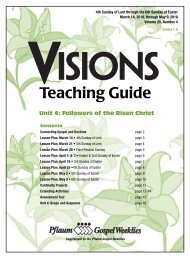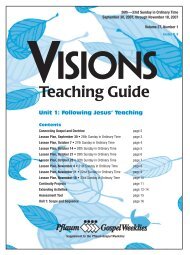Catechist Training Master 1 - Pflaum Home
Catechist Training Master 1 - Pflaum Home
Catechist Training Master 1 - Pflaum Home
You also want an ePaper? Increase the reach of your titles
YUMPU automatically turns print PDFs into web optimized ePapers that Google loves.
● Do you have storytellers who<br />
might do Gospel storytelling<br />
at the Seeds prereading<br />
level or who might use their<br />
storytelling abilities to enhance<br />
the children’s stories found<br />
in all of the <strong>Pflaum</strong> Gospel<br />
Weeklies editions?<br />
● Do you have puppeteers who<br />
can help children tell the<br />
Gospel with puppets?<br />
● Can you draw on someone who<br />
knows birds and flowers and<br />
might lead children on a nature<br />
walk?<br />
● What videos and music does<br />
your parish have that you can<br />
incorporate in the religious<br />
education program? What<br />
videos can you rent?<br />
<strong>Training</strong> Calendar<br />
<strong>Catechist</strong>s are not born. They<br />
develop through training and<br />
experience. The <strong>Pflaum</strong> Gospel<br />
Weeklies provide online Resource<br />
Manuals for each edition. These<br />
manuals are every catechist’s<br />
primary training tool. They provide<br />
background for catechists in the<br />
faith development of children, and<br />
the design and flow of each lesson<br />
in the Weeklies.<br />
This chapter of the Handbook<br />
suggests three inservice training<br />
sessions with catechists each<br />
year and a concluding evaluation/<br />
celebration session.<br />
<strong>Catechist</strong> Inservice Session 1:<br />
Orientation<br />
<strong>Catechist</strong> Inservice Session 2:<br />
Advent/Christmas: Exploring the<br />
Incarnation Mystery<br />
<strong>Catechist</strong> Inservice Session 3:<br />
Lent/Easter: Exploring the<br />
Paschal Mystery<br />
Evaluation and Celebration<br />
Drawing on the online Resource<br />
Manuals for training and discussion<br />
content, this chapter provides the<br />
resources the DRE needs to become<br />
the catechist to his or her catechists.<br />
<strong>Catechist</strong>s’ Needs<br />
If the parish has experience<br />
using the Weeklies, the director<br />
must both meet the needs of new<br />
catechists and survey experienced<br />
catechists to identify their evolving<br />
needs. A director can draw<br />
experienced catechists into training<br />
and mentoring new volunteers<br />
and into helping one another learn<br />
new techniques. For example,<br />
a primary-level catechist who is<br />
a good storyteller or who uses<br />
creative drama effectively can help<br />
others develop these valuable ways<br />
of involving children in their own<br />
learning.<br />
Orientation of new volunteer<br />
catechists usually includes:<br />
● the flow of a <strong>Pflaum</strong> Gospel<br />
Weeklies lesson;<br />
● the management of class time<br />
and space;<br />
● guidelines regarding discipline,<br />
attendance, use of the building,<br />
and other expectations and<br />
responsibilities.<br />
When a parish shifts for the first<br />
time into a liturgical catechesis<br />
approach, the director needs to<br />
familiarize all catechists and parents<br />
with the aims and resources of<br />
the new program. Experienced<br />
catechists benefit from overviewing<br />
how the <strong>Pflaum</strong> Gospel Weeklies<br />
provide the elements of basic,<br />
comprehensive catechesis. They<br />
usually want to know where they<br />
offer lessons on concepts that they<br />
are used to teaching, such as Old<br />
Testament, Commandments,<br />
prayers, and Sacraments.<br />
All teachers, catechists, and<br />
parents need ongoing help<br />
internalizing the doctrinal themes of<br />
the liturgical year. Each inservice<br />
session should include time to<br />
identify the doctrinal themes of the<br />
24<br />
liturgical seasons that upcoming<br />
Weeklies explore.<br />
Tailoring Inservice<br />
Sessions<br />
Directors have the role of suiting<br />
inservice sessions to the specific<br />
needs of their catechists. This<br />
Handbook describes three inservice<br />
sessions, which can work in any<br />
of the implementation models that<br />
earlier Handbook chapters describe.<br />
Depending on the needs of those<br />
using the <strong>Pflaum</strong> Gospel Weeklies<br />
the director can plan training<br />
sessions for:<br />
1. Total group;<br />
2. Grade- or edition-level groups;<br />
3. Self-directed groups in which<br />
catechists work together;<br />
4. High-interest presentations by<br />
outside specialists.<br />
The important part of catechist<br />
training—and this also applies to<br />
training parents as catechists of their<br />
children—is to ensure that your<br />
catechists meet and exchange ideas<br />
with you and with one another, that<br />
they meet in smaller groups to plan<br />
especially for the edition levels<br />
they teach, and that they learn more<br />
about special topics.<br />
Inservice Topics<br />
Each online Resource Manual<br />
offers a menu of possible topics<br />
for inservice presentations. This<br />
Handbook provides training masters<br />
for those topics, especially useful<br />
for the first year of the liturgical<br />
catechesis approach. Directors<br />
can use the menu to create their<br />
own inservice sessions to respond<br />
to the needs of their catechists in<br />
subsequent years of implementation.

















